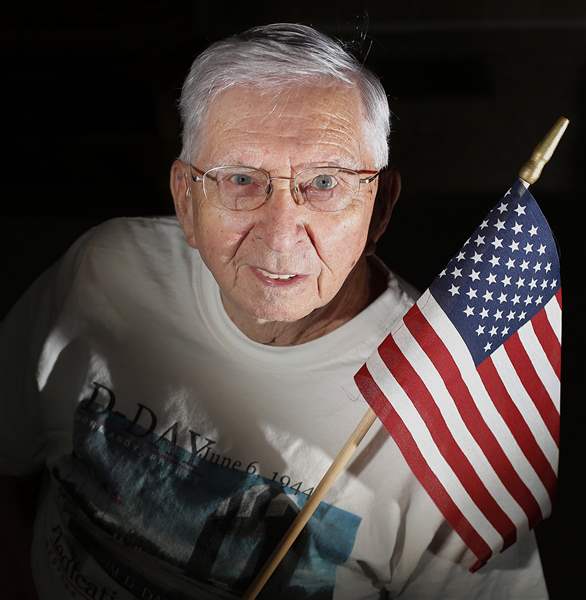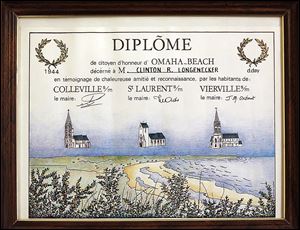
D-DAY’s 70TH ANNIVERSARY
Local vets, families tell tales of fear, valor
WWII memories not to be forgotten
6/6/2014
Clinton Longenecker was only 19 years old in 1944, and D-Day was his first time under fire. He went on to earn a Silver Star and suffer an injured arm.
THE BLADE/JEREMY WADSWORTH
Buy This Image

Clinton Longenecker was only 19 years old in 1944, and D-Day was his first time under fire. He went on to earn a Silver Star and suffer an injured arm.
In a letter to his father in 1944, Clinton Longenecker joked that he had thrown him a party.
But on June 6, Mr. Longenecker was not in Toledo. He was on Omaha Beach, helping to repel the German front.
“I was telling him where I was at without giving away any secrets,” Mr. Longenecker, 90, said.
COMMENTARY: D-Day in the shadow of one who served
Today, on the 70th anniversary of D-Day, veterans are recounting their stories, and children are picking up their parents’ mantle to preserve the memories of World War II.
Mr. Longenecker was only 19 when the 81st Chemical Mortar Battalion floated to the Normandy shore with life preservers. D-Day was his first day in battle.
“We were really greenhorns,” Mr. Longenecker said. “We did anything we could do to find a place to hide, because the Germans were up on the hill, and they had perfect view of us.”
They were fighting against tyranny, Mr. Longenecker said, but as they huddled at the base of the hill for four hours, waiting for a small road used by fishermen to be cleared of machine-gun fire, their goal was to make it out alive.
He has a Silver Star for the five major battles he fought in France, Belgium, Luxembourg, Austria, and Germany and an injured arm to prove that he was there.

Clinton Longenecker was made an honorary French citizen. He will speak today at the American Legion Post 335 as many recall the fight that began the end of the war.
Paul Poole is wearing his father’s dog tags today.
John Poole died in 1995 at the age of 74, but his son still has an album with photos from the war.
The late Mr. Poole was part of the 555th Tank Destroyer Battalion, in a division nicknamed “Hell on Wheels.”
When Mr. Poole shot a man for the first time on D-Day, he vomited.
“In all his time of fighting, it was the worst he ever went through,” his daughter, Kathy Kasper, said.
Before his son entered Waite High School, Mr. Poole pointed out the men he had known on the memorial in front, and he sometimes spent nights watching TV to avoid the nightmares he called ghost walks.
“My dad would get real quiet. It was almost like he was off in another place, and I know he was thinking about [WWII],” Michael Poole, another son, said.
The elder Mr. Poole never wanted to be buried in wintertime because he remembered the men who froze to death next to him. His children’s consolation was to place a blanket on his grave when it snowed at the burial.
Mr. Longenecker will speak before the American Legion Toledo Post 335 today. In the past, he would have arrived with a G.I. haircut, as part of a pact with his friends. This year, with only seven men remaining out of his 750-man battalion, he has left his hair as is.
Ms. Kasper is going to bring flowers and an American flag to the cemetery. She will take a sip from a bottle of beer or cognac and pour the rest on her father’s grave.
Families commemorate D-Day in different ways, whether by remembering war stories while they sit at work, as Paul Poole does, or by returning to the beaches of Normandy, as Michael Poole did in 1987. But each year, fewer veterans tell their stories.
George Pugh, who has spent hours combing through videos of interviews for the Library of Congress Veterans History Project, said his work is as much for the families as for the historical records.
“We need to make every effort that we can to let our future generations know what these people went through,” he said. “It would be a real mistake to have them fade.”
Contact Maya Averbuch at: maverbuch@theblade.com or 419-724-6522